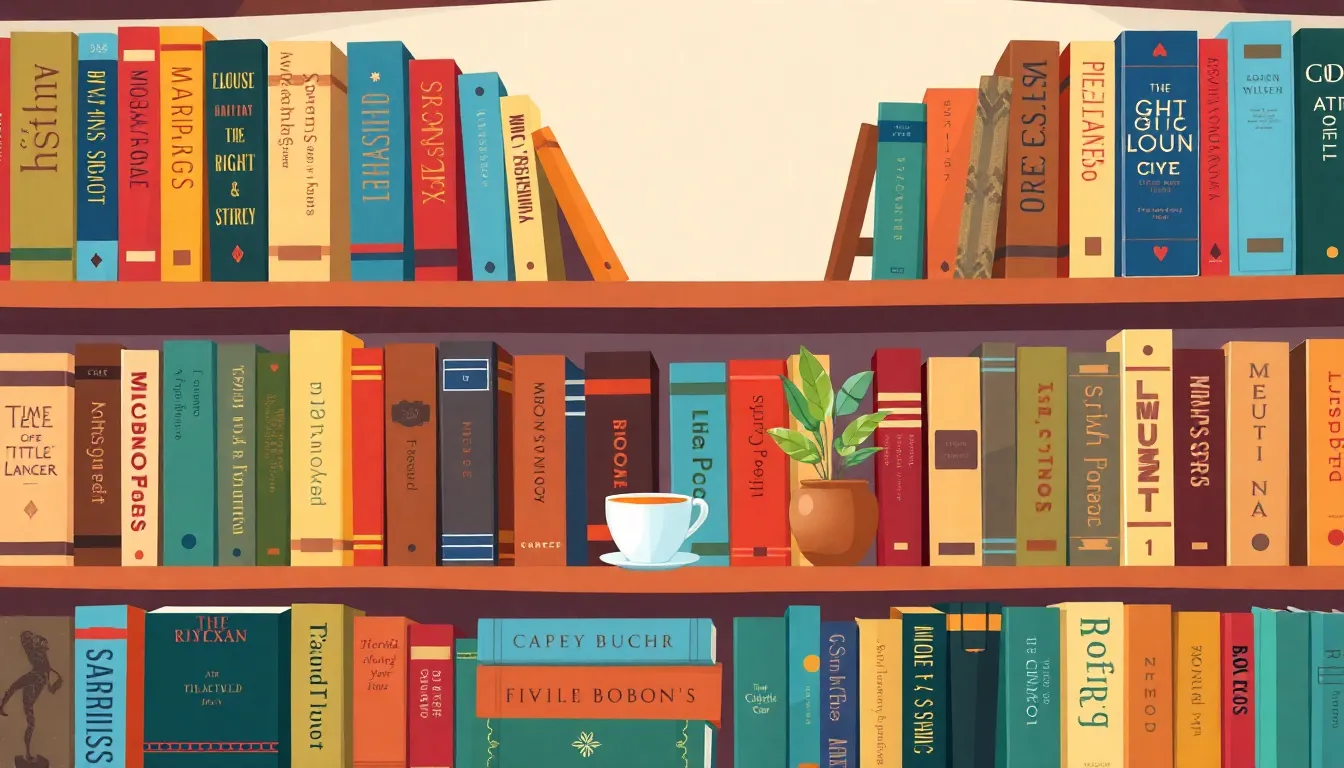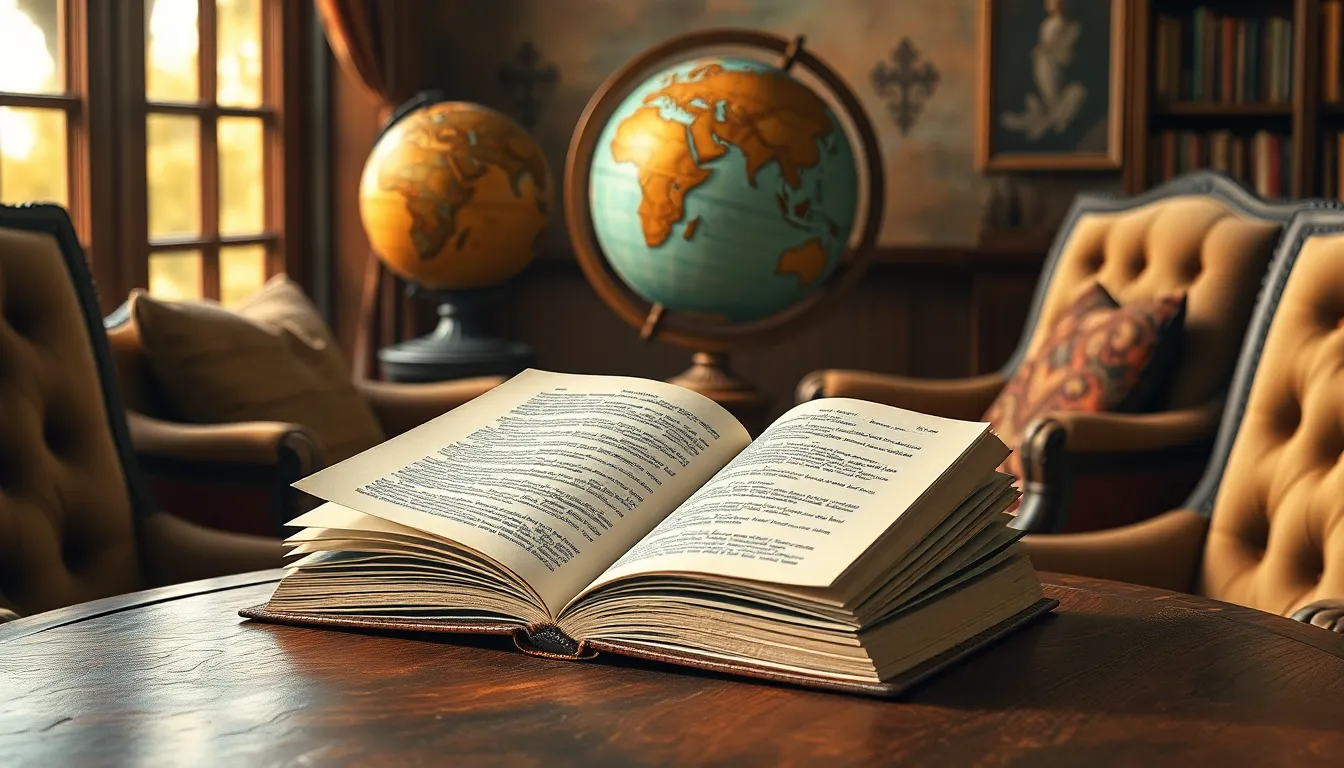
Famous Fiction Books That Will Transform Your Imagination and Perspectives
Fiction has a magical way of whisking readers away to worlds where dragons fly and detectives solve mysteries over a cup of coffee. Famous fiction books don’t just entertain; they challenge perspectives and spark imaginations. From timeless classics to modern masterpieces, these stories have a knack for sticking with readers long after the last page is turned.
Famous Fiction Books
Famous fiction books transport readers into new realms filled with unforgettable characters and intricate plots. Renowned authors create immersive experiences through their storytelling, engaging emotions and sparking curiosity. Classic novels like “Pride and Prejudice” and “Moby-Dick” challenge cultural norms while remaining relevant today. Contemporary works such as “The Road” and “The Night Circus” showcase the evolving style of narrative and thematic exploration.
Diverse genres exist within fiction, including science fiction, fantasy, romance, and historical fiction. Science fiction staples like “Dune” examine futuristic societies and technological advances, while fantasy epics like “The Hobbit” introduce readers to magical landscapes. Romance novels often explore the complexities of love and relationships, drawing readers into emotional journeys.
The impact of these narratives extends beyond enjoyment. Such works influence culture, provoke discussion, and inspire creativity. Iconic titles can be found on required reading lists for various educational institutions, proving their place in literary canon. Book clubs often highlight these famous titles, allowing readers to unpack themes and share interpretations, fostering a sense of community.
Recognition of famed fiction books comes through literary awards and critical acclaim. Winning accolades like the Pulitzer Prize and the Booker Prize distinguishes these works, validating their significance in literature. Bestselling lists reflect popularity, indicating ongoing interest and engagement among readers.
Fiction serves as a mirror, reflecting societal issues while inviting readers to explore different perspectives. Marvelous storytelling and powerful themes resonate universally, forging connections that transcend time and place. Readers not only find solace in these stories but also confront challenging ideas through the lens of fiction.
Classic Fiction Books

Classic fiction books capture the essence of storytelling, often reflecting societal norms and human experiences. These works remain relevant across generations, continuing to engage readers.
Timeless Novels
Timeless novels such as “Pride and Prejudice” and “Moby-Dick” stand out for their intricate plots and memorable characters. Readers often find Elizabeth Bennet’s wit and Captain Ahab’s obsession unforgettable. “To Kill a Mockingbird” offers profound themes of justice and morality that resonate strongly in modern discussions. “1984” explores themes of surveillance and control, remaining unsettlingly relevant today. Each of these classics invites reflection, urging readers to consider their own values and beliefs while navigating societal challenges.
Influential Authors
Influential authors shape the landscape of literature through their groundbreaking works. Jane Austen’s sharp social commentary continues to inspire new narratives about love and class. Herman Melville transforms the whaling adventure into an exploration of the human condition through his storytelling. Harper Lee’s approach to themes of racial injustice establishes a lasting legacy with “To Kill a Mockingbird”. George Orwell’s rich depictions of dystopian futures provoke critical thinking on governance and individuality. Each author’s distinctive voice and vision plays a pivotal role in forming literary traditions that persist to this day.
Contemporary Fiction Books
Contemporary fiction reflects current societal themes and challenges, engaging readers through relatable narratives and characters.
Bestsellers of the Last Decade
Recent bestsellers have captivated audiences with their diverse styles and compelling stories. Titles like “Where the Crawdads Sing” by Delia Owens have achieved immense popularity, combining elements of mystery, romance, and coming-of-age narratives. “The Vanishing Half” by Brit Bennett explores themes of race and identity, resonating with many readers through its complex characters and rich storytelling. Additionally, “The Midnight Library” by Matt Haig offers a unique perspective on life choices and regrets, prompting introspection among its audience. These novels showcase how contemporary fiction engages with profound issues in entertaining ways, solidifying their place in modern literature.
Emerging Voices
Emerging voices in contemporary fiction challenge conventions and introduce fresh perspectives. Authors such as Ocean Vuong, with his poignant debut “On Earth We’re Briefly Gorgeous,” blend poetic prose with deeply personal narratives, exploring themes of identity and family. Similarly, Brit Bennett continues to make waves with her thought-provoking storytelling that reflects the complexities of African American life. Another noteworthy author, Jennifer Yu, captivates readers with her debut “The Last Thing He Told Me,” threading mystery and emotional depth into her narratives. These writers exemplify the vibrant and evolving landscape of contemporary fiction, enriching literary discourse with their unique insights.
Genre-Specific Famous Fiction Books
Fiction encompasses various genres, each with unique narratives that captivate readers. Recognizing genre distinctions enhances appreciation for storytelling.
Science Fiction and Fantasy
Science fiction and fantasy transport readers to extraordinary realms. Classic works like “Dune” by Frank Herbert and “The Hobbit” by J.R.R. Tolkien exemplify this genre. “Dune” explores ecological and political themes, while “The Hobbit” features a quest for treasure and the battle against dark forces. Contemporary titles, such as “The Expanse” series by James S.A. Corey and “Circe” by Madeline Miller, showcase diverse perspectives within the genres. “The Expanse” merges science and human elements, engaging readers with gripping conflict. In contrast, “Circe” reimagines mythological tales through a fresh lens. Both genres highlight the imagination’s power, sparking discussion about cultural and moral issues.
Mystery and Thriller
Mystery and thriller novels keep readers on the edge of their seats. Classics like “Gone Girl” by Gillian Flynn and “The Big Sleep” by Raymond Chandler exemplify compelling narratives filled with suspense. “Gone Girl” delves into the complexity of relationships and media influence. Meanwhile, “The Big Sleep” introduces hard-boiled detective Philip Marlowe, engaging readers with intricate plots and characters. Modern works such as “The Girl with the Dragon Tattoo” by Stieg Larsson create riveting experiences through twists and psychological insight. These narratives foster deep engagement, encouraging discussions on human nature and ethics while keeping readers guessing until the final page.
Conclusion
Famous fiction books continue to shape readers’ lives and perspectives in profound ways. They invite exploration of diverse themes and human experiences while fostering connections among readers. As these narratives unfold across genres they not only entertain but also challenge societal norms and provoke thought.
The timelessness of classics paired with the relevance of contemporary works ensures that literature remains a vital part of cultural discourse. Each story offers a unique lens through which to understand the world, making fiction an essential element of personal and collective growth. Engaging with these narratives enriches lives and inspires creativity, proving that the power of storytelling knows no bounds.
